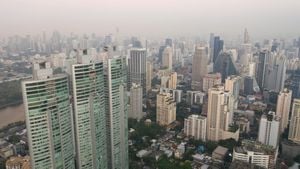Haryana Congress MPs have voiced strong objections against the deportation of Indian nationals from the United States, particularly focusing on the recent incident where 104 Indians were reportedly returned to India handcuffed aboard a US Air Force aircraft. This event has ignited heated discussions surrounding the dignity and treatment of Indian citizens abroad, particularly among those who made perilous journeys to the US seeking employment.
Among those deported, 33 hailed from Haryana, prompting outrage from local political leaders. Rohtak Lok Sabha MP Deepender Hooda, representing the IND-IA bloc, described the forced repatriation as "an insult to the entire country." He emphasized the dishonor associated with Indians being escorted back to their homeland shackled and especially criticized the supposed friendship between Indian Prime Minister Narendra Modi and US President Joe Biden.
According to Hooda, this recent deportation reflects poorly on India's international relations, especially considering the investments made by individuals who sought opportunities abroad, often selling their land and belongings for the chance to build new lives. "These youths ventured to foreign shores with dreams of prosperity, but have returned facing devastation and social displacement," Hooda stated. He called on Prime Minister Modi to engage directly with US authorities to address the treatment of Indian nationals and advocate for legal protections for those facing deportation.
"This is more than just about deportation; it’s about our youth and their dreams, shattered by lack of employment opportunities at home," Hooda lamented. The Congress leader also highlighted alarming statistics from the US Customs and Border Patrol, noting over 90,000 Indian nationals were apprehended illegally trying to cross the southern US border within the last year. He called the government's current policy approach ineffective and damaging, inflaming the socioeconomic crises faced by families and communities across Haryana.
Randeep Surjewala, another notable Congress Rajya Sabha MP, also raised pointed questions during parliamentary sessions, demanding accountability for the treatment of Indians during deportation. Surjewala underscored the harsh realities faced by those deported, stating, "Why has the government remained silent? Our citizens are repeatedly imprisoned and returned home under terror-like conditions, often chained and deprived of proper sanitary facilities for long periods.” He emphasized the need for immediate government intervention and asked, “How many of our Indian brothers and sisters are currently detained without proper help? What steps are being taken to advocate for their wellbeing?”
The protests gained momentum as Sirsa MP Kumari Selja echoed these sentiments, asserting the necessity for job creation to prevent young people from resorting to dangerous routes for employment abroad. She highlighted the importance of dismantling existing human trafficking networks and suggested the establishment of transparent migration policies to prevent similar situations for Indians seeking opportunities overseas.
The outrage was not limited to congress leaders; public sentiment has also pushed back hard against the US’s actions. The issue became particularly pronounced when reports surfaced detailing the horrific experiences of deported individuals, some of whom claimed they suffered mistreatment and torture during their efforts to enter the United States. Such revelations have incited feelings of national embarrassment and prompted calls for accountability.
Further compounding the situation, multiple calls for government action have emerged, with leaders like Hooda urging the establishment of legal aid resources for affected families. He noted, “If the government had heeded our warnings about the rising number of illegal crossings, we might not have had to witness these tragic circumstances.” His remarks resonate with many who believe the exodus of youth seeking work is tied deeply to the state’s inability to provide adequate employment opportunities and vocational training.
With the matter drawing national attention, External Affairs Minister S. Jaishankar assured the press during the parliamentary uproar, asserting, "India will engage with the US government to prevent the use of restraints on deportees." This statement, though reassuring, lacks the immediate action many citizens and opposition leaders are calling for. The process of repatriation and the treatment accorded to Indian nationals have intensified discussions about the governmental responsibility to protect its citizens abroad.
The political discourse surrounding the deportations has not only illuminated the struggles of those affected but also highlighted larger systemic issues, including the failures of India’s current employment policies. The outcry for justice might catalyze necessary reforms, yet critics argue the urgency remains high as families await clarity on the fate of their deported loved ones. Without swift and effective action from governmental bodies, the repercussions for these individuals and their families could be lasting and detrimental.
Therefore, as political leaders continue to voice concerns and advocate for change, it remains pivotal for the Indian government to address the root causes of migration and the circumstances leading to these troubling deportation episodes. The challenge lies not just within diplomatic dialogue but also within the framework of providing real solutions for millions of young Indians who continue to search for opportunities beyond their homeland.



